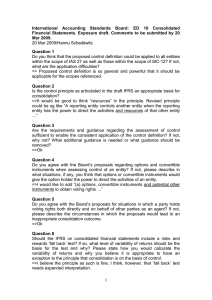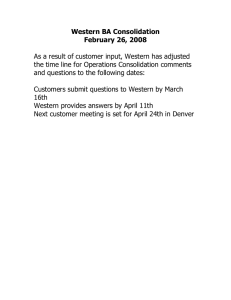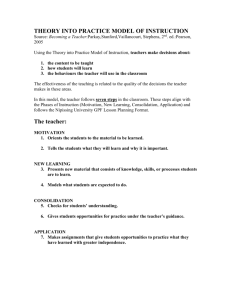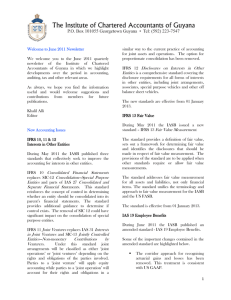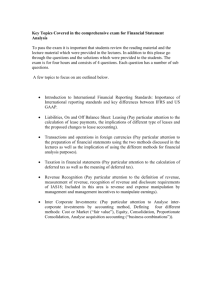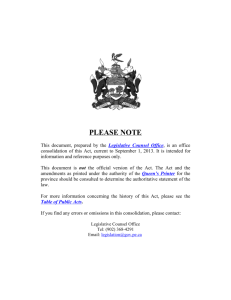CIMA to IASB ED10 Consolidation Final 09-03-20.doc
advertisement
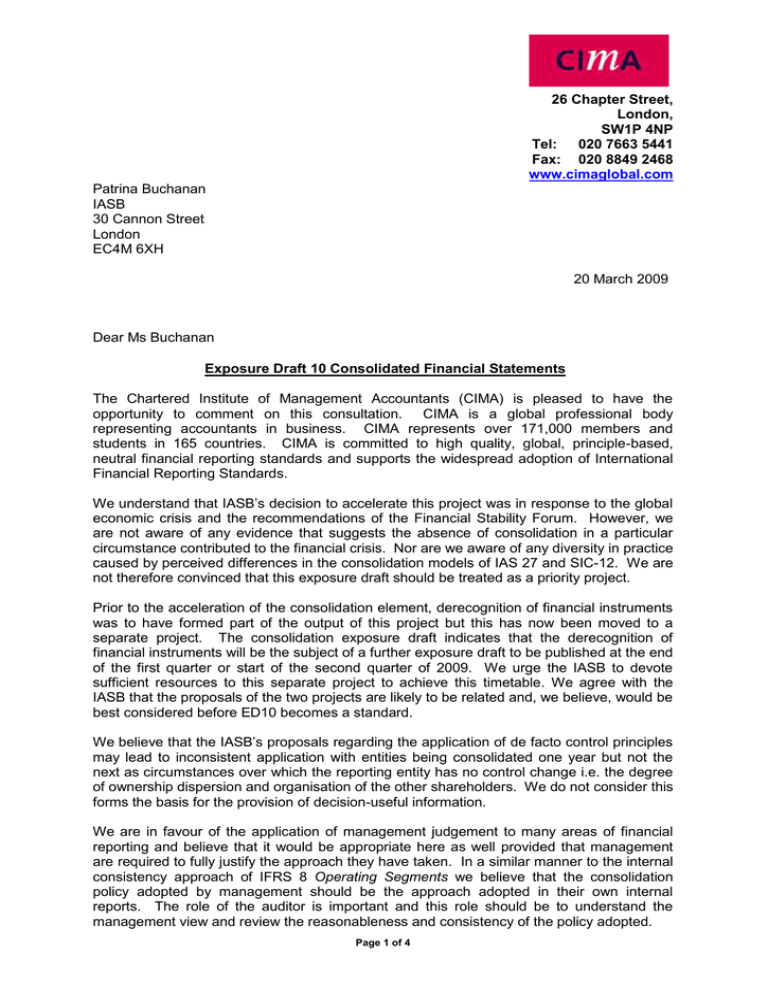
26 Chapter Street, London, SW1P 4NP Tel: 020 7663 5441 Fax: 020 8849 2468 www.cimaglobal.com Patrina Buchanan IASB 30 Cannon Street London EC4M 6XH 20 March 2009 Dear Ms Buchanan Exposure Draft 10 Consolidated Financial Statements The Chartered Institute of Management Accountants (CIMA) is pleased to have the opportunity to comment on this consultation. CIMA is a global professional body representing accountants in business. CIMA represents over 171,000 members and students in 165 countries. CIMA is committed to high quality, global, principle-based, neutral financial reporting standards and supports the widespread adoption of International Financial Reporting Standards. We understand that IASB’s decision to accelerate this project was in response to the global economic crisis and the recommendations of the Financial Stability Forum. However, we are not aware of any evidence that suggests the absence of consolidation in a particular circumstance contributed to the financial crisis. Nor are we aware of any diversity in practice caused by perceived differences in the consolidation models of IAS 27 and SIC-12. We are not therefore convinced that this exposure draft should be treated as a priority project. Prior to the acceleration of the consolidation element, derecognition of financial instruments was to have formed part of the output of this project but this has now been moved to a separate project. The consolidation exposure draft indicates that the derecognition of financial instruments will be the subject of a further exposure draft to be published at the end of the first quarter or start of the second quarter of 2009. We urge the IASB to devote sufficient resources to this separate project to achieve this timetable. We agree with the IASB that the proposals of the two projects are likely to be related and, we believe, would be best considered before ED10 becomes a standard. We believe that the IASB’s proposals regarding the application of de facto control principles may lead to inconsistent application with entities being consolidated one year but not the next as circumstances over which the reporting entity has no control change i.e. the degree of ownership dispersion and organisation of the other shareholders. We do not consider this forms the basis for the provision of decision-useful information. We are in favour of the application of management judgement to many areas of financial reporting and believe that it would be appropriate here as well provided that management are required to fully justify the approach they have taken. In a similar manner to the internal consistency approach of IFRS 8 Operating Segments we believe that the consolidation policy adopted by management should be the approach adopted in their own internal reports. The role of the auditor is important and this role should be to understand the management view and review the reasonableness and consistency of the policy adopted. Page 1 of 4 We do not agree with the separation of structured entities from the main body of guidance. In our opinion structured entities should be assessed on a risks and returns basis which is already included in the definition of control in the draft IFRS. We attach responses to your specific questions and would be pleased to discuss with you any aspect of this letter that you may wish to raise with us. Yours sincerely Nick Topazio Charles Batchelor Nick Topazio Charles Batchelor Business & Financial Reporting Specialist, Financial Reporting Development Group CIMA London Chairman Financial Reporting Development Group CIMA London Page 2 of 4 Responses to the specific consultation questions : Question 1: Do you think that the proposed control definition could be applied to all entities within the scope of IAS 27 as well as those within the scope of SIC-12? If not, what are the application difficulties? Yes, we believe that the proposed control definition could be applied to all entities within the scope of IAS 27 as well as those within the scope of SIC-12. Question 2: Is the control principle as articulated in the draft IFRS an appropriate basis for consolidation? We believe that the control principle as articulated could prove an appropriate basis for consolidation however we also believe that the control principle may prove to be difficult to apply in practice consistently and therefore could lead to inconsistency of application, for example in relation to de facto control and the treatment of options and convertibles. Question 3: Are the requirements and guidance regarding the assessment of control sufficient to enable the consistent application of the control definition? If not, why not? What additional guidance is needed or what guidance should be removed? Question 4: Do you agree with the Board’s proposals regarding options and convertible instruments when assessing control of an entity? If not, please describe in what situations, if any, you think that options or convertible instruments would give the option holder the power to direct the activities of an entity. We do not believe that the requirements and guidance regarding the assessment of control is sufficient to necessarily result in consistent application of the control definition. We perceive significant scope for potential unexplained management judgement and therefore potential for inconsistent application from one entity to another. However, we are in favour of the application of management judgement to many areas of financial reporting and believe that it would be appropriate here as well provided that management are required to fully justify the approach they have taken. In a similar manner to the internal consistency approach of IFRS 8 Operating Segments we believe that the consolidation policy adopted by management should be the approach adopted in their own internal reports. The role of the auditor is important and this role should be to understand the management view and review the reasonableness and consistency of the policy adopted. Question 5: Do you agree with the Board’s proposals for situations in which a party holds voting rights both directly and on behalf of other parties as an agent? If not, please describe the circumstances in which the proposals would lead to an inappropriate consolidation outcome. We have chosen not to respond to this question. Question 6: Do you agree with the definition of a structured entity in paragraph 30 of the draft IFRS? If not, how would you describe or define such an entity? Question 7: Are the requirements and guidance regarding the assessment of control of a structured entity in paragraphs 30-38 of the draft IFRS sufficient to enable consistent application of the control definition? If not, why not? What additional guidance is needed? Page 3 of 4 We do not believe that there should be a separate definition for a structured entity. There should be one control model that is capable of being applied consistently to all arrangements. Question 8: Should the IFRS on consolidated financial statements include a risks and rewards “fall back” test? If so, what level of variability of returns should be the basis for the test and why? Please state how you would calculate the variability of returns and why you believe it is appropriate to have an exception to the principle that consolidation is on the basis of control. There should be no “fall back” test as, we believe, this risks creating a “bright line”, i.e. the fall-back test becomes a de minimis requirement, which creates an opportunity for financial engineering. The application of management judgement and auditor review should be sufficient. Question 9: Do the proposed disclosure requirements described in paragraph 23 provide decision-useful information? Please identify any disclosure requirements that you think should be removed from, or added to, the draft IFRS. Question 10: Do you think that reporting entities will, or should, have available the information to meet the disclosure requirements? Please identify those requirements with which you believe it will be difficult for reporting entities to comply, or that are likely to impose significant costs on reporting entities. We believe that it is important that the final disclosure requirements recognise that there may be circumstances in which the cost of obtaining certain information outweighs the benefit of disclosing it and in these cases disclosure should not be required. Also it may not be possible to obtain information relating to the financial affairs of non-controlling interests, such as in paragraph 23 (b), due to a lack of control. Question 11: (a) Do you think that reputational risk is an appropriate basis for consolidation? If so, please describe how it meets the definition of control and how such a basis of consolidation might work in practice. (b) Do you think that the proposed disclosures in paragraph B47 are sufficient? If not, how should they be enhanced? We are of the view that it is inappropriate to use reputational risk as a basis for consolidation. Reputational risk is not a recognised accounting measure and we believe that it would be very difficult to apply in practice. Question 12: Do you think that the Board should consider the definition of significant influence and the use of the equity method with a view to developing proposals as part of a separate project that might address the concerns raised relating to IAS 28? This would be a logical follow-up to the project on consolidation and further guidance on significant influence and the use of the equity method may be needed to ensure consistency. Page 4 of 4
